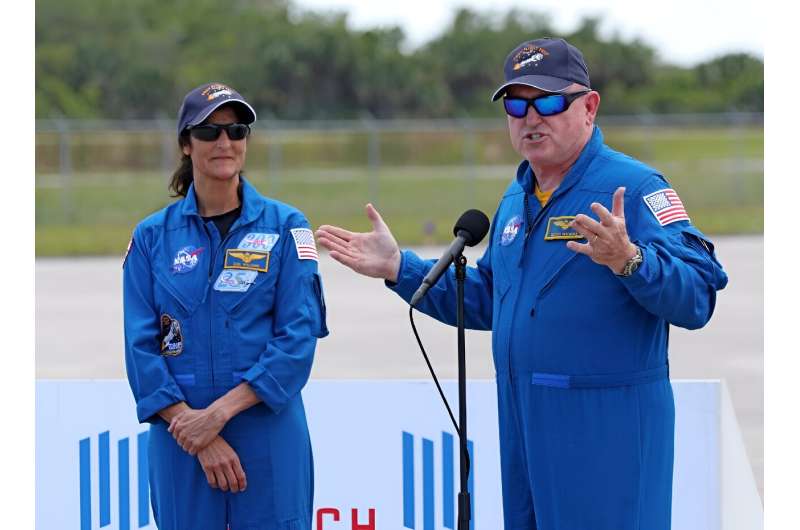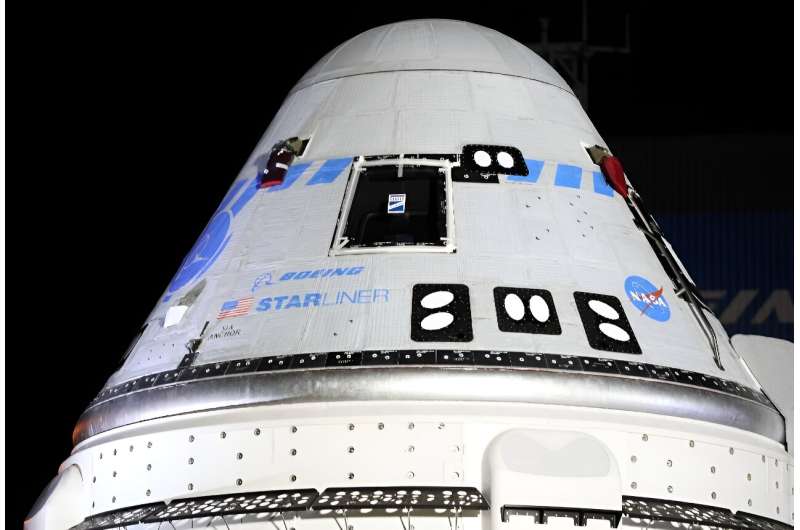Lunar railway initiative aims to streamline moonbase logistics
Sunday, 05 May 2024 16:38 NASA is advancing plans for the first lunar railway system, described as a critical component for the daily operations of a sustainable lunar base envisioned for the 2030s. This initiative is part of NASA's broader Moon to Mars plan, which includes mission concepts like the Robotic Lunar Surface Operations 2 (RLSO2).
"We want to build the first lunar railway system, which will provide reli
NASA is advancing plans for the first lunar railway system, described as a critical component for the daily operations of a sustainable lunar base envisioned for the 2030s. This initiative is part of NASA's broader Moon to Mars plan, which includes mission concepts like the Robotic Lunar Surface Operations 2 (RLSO2).
"We want to build the first lunar railway system, which will provide reli EarthCARE satellite set for launch
Sunday, 05 May 2024 16:38 Recently, ESA's EarthCARE satellite was removed from its transport container at Vandenberg Space Force Base, California, beginning an intensive period of preparation for its upcoming launch. The team conducted detailed inspections and testing to ensure the satellite was in optimal condition for its mission.
Ensuring the cleanliness of EarthCARE was a critical step in optimizing the perform
Recently, ESA's EarthCARE satellite was removed from its transport container at Vandenberg Space Force Base, California, beginning an intensive period of preparation for its upcoming launch. The team conducted detailed inspections and testing to ensure the satellite was in optimal condition for its mission.
Ensuring the cleanliness of EarthCARE was a critical step in optimizing the perform SpaceX reveals EVA suit design as Polaris Dawn mission approaches
Sunday, 05 May 2024 01:40

Boeing's Starliner finally ready for first crewed mission
Saturday, 04 May 2024 07:18
Launch day is finally here: Boeing's Starliner capsule blasts off Monday to the International Space Station on its first crewed mission—several years after SpaceX first achieved the same milestone.
The flight, a final test before Starliner takes up regular service for NASA, is critical for the US aerospace giant, whose reputation has suffered of late due to safety issues with some of its passenger jets.
Starliner, which was first ordered a decade ago by the US space agency, has had a bumpy ride to the finish line, with surprise setbacks and multiple delays—a saga Boeing is eager to complete.
Astronauts Butch Wilmore and Suni Williams are set to leave Cape Canaveral at 10:34 pm Monday (0234 GMT Tuesday) aboard the capsule.
Boeing's Starliner joins select club of crewed US spaceships
Saturday, 04 May 2024 07:17
Throughout the annals of American space exploration, a select few spacecraft have had the distinction of carrying human beings beyond Earth.
Next week, Boeing is poised to join this elite group with the long-awaited launch of its Starliner capsule, just the sixth class of vessel built in the United States for NASA astronauts.
Here's a recap of their storied past, marked by groundbreaking triumphs and some devastating setbacks.
Mercury
Known as America's "man-in-space" program, Project Mercury was born just days after NASA itself was formed in 1958, and officials settled on the term "astronauts" for its space explorers.
On May 5, 1961, Alan Shepard became the first American to fly in space during a 15-minute suborbital flight in the one-man, cone-shaped capsule—about a month after the Soviet Union's Yuri Gagarin became the first human to achieve the feat.
China launches first probe to collect samples from far side of Moon
Friday, 03 May 2024 19:59 China launched a probe on Friday to collect samples from the far side of the Moon, a world first as Beijing pushes ahead with an ambitious programme that aims to send a crewed lunar mission by 2030.
A rocket carrying the Chang'e-6 lunar probe blasted off from the Wenchang Space Launch Centre in southern China's Hainan province just before 5:30 pm (0930 GMT), AFP journalists near the site s
China launched a probe on Friday to collect samples from the far side of the Moon, a world first as Beijing pushes ahead with an ambitious programme that aims to send a crewed lunar mission by 2030.
A rocket carrying the Chang'e-6 lunar probe blasted off from the Wenchang Space Launch Centre in southern China's Hainan province just before 5:30 pm (0930 GMT), AFP journalists near the site s SpaceX completes bicoastal launches, adding to Starlink's megaconstellation
Friday, 03 May 2024 19:59 SpaceX launched another group of 23 satellites from Kennedy Space Center on Thursday night via a Falcon 9 rocket, adding to the Starlink megacluster of Internet satellites now in low-Earth orbit.
The launches have become nearly routine as have the return of reusable fuel cell booster rocket to a drone awaiting below.
Thursday night, the booster, guided by short rocket bursts, returne
SpaceX launched another group of 23 satellites from Kennedy Space Center on Thursday night via a Falcon 9 rocket, adding to the Starlink megacluster of Internet satellites now in low-Earth orbit.
The launches have become nearly routine as have the return of reusable fuel cell booster rocket to a drone awaiting below.
Thursday night, the booster, guided by short rocket bursts, returne Satellogic unveils expansive high-resolution image dataset for AI training
Friday, 03 May 2024 19:59 Satellogic Inc. (NASDAQ: SATL) has made public a substantial open dataset from its collection. This dataset is composed of approximately 3 million unique location images, doubling to 6 million with revisits, and is designed to enhance the training of AI foundation models. Each 384x384 pixel image contributes to the overall 900 Gigapixels, covering diverse land uses, objects, geographies, and sea
Satellogic Inc. (NASDAQ: SATL) has made public a substantial open dataset from its collection. This dataset is composed of approximately 3 million unique location images, doubling to 6 million with revisits, and is designed to enhance the training of AI foundation models. Each 384x384 pixel image contributes to the overall 900 Gigapixels, covering diverse land uses, objects, geographies, and sea Millennium Space Systems secures $414 million contract from Space Development Agency
Friday, 03 May 2024 19:59 Millennium Space Systems, a subsidiary of Boeing [NYSE: BA], has been awarded a contract potentially worth $414 million by the Space Development Agency. The contract involves the delivery of the Fire-control On Orbit-support-to-the-war Fighter, known as FOO Fighter or F2. The company will act as the end-to-end operational prime, responsible for deploying a constellation of eight satellites along
Millennium Space Systems, a subsidiary of Boeing [NYSE: BA], has been awarded a contract potentially worth $414 million by the Space Development Agency. The contract involves the delivery of the Fire-control On Orbit-support-to-the-war Fighter, known as FOO Fighter or F2. The company will act as the end-to-end operational prime, responsible for deploying a constellation of eight satellites along BAE Systems to construct new atmospheric sensor for NOAA's GeoXO satellites
Friday, 03 May 2024 19:59 BAE Systems (LON: BA) has been tasked by NASA to develop the Atmospheric Composition instrument (ACX) for deployment on NOAA's upcoming Geostationary Extended Observations (GeoXO) satellite constellation. This initiative is part of an effort to enhance Earth observation capabilities previously established by the Geostationary Operational Environmental Satellites-R series (GOES-R).
The GeoX
BAE Systems (LON: BA) has been tasked by NASA to develop the Atmospheric Composition instrument (ACX) for deployment on NOAA's upcoming Geostationary Extended Observations (GeoXO) satellite constellation. This initiative is part of an effort to enhance Earth observation capabilities previously established by the Geostationary Operational Environmental Satellites-R series (GOES-R).
The GeoX Air Force project blends military and commercial space networks
Friday, 03 May 2024 17:17

HyImpulse successfully launch their SR75 rocket from Southern Launch
Friday, 03 May 2024 15:55 HyImpulse has successfully launched their SR75 rocket from the Koonibba Test Range, operated by Southern Launch, marking a significant step in Australia's commercial launch capabilities. The SR75, one of the largest rockets launched commercially in Australia, drew an audience of locals and VIPs from across Australia and Europe who witnessed the event on South Australia's Far West Coast.
HyImpulse has successfully launched their SR75 rocket from the Koonibba Test Range, operated by Southern Launch, marking a significant step in Australia's commercial launch capabilities. The SR75, one of the largest rockets launched commercially in Australia, drew an audience of locals and VIPs from across Australia and Europe who witnessed the event on South Australia's Far West Coast. Webb telescope's study suggests life on exoplanet remains unconfirmed
Friday, 03 May 2024 15:55 Excitement was high when NASA's James Webb Space Telescope reported potential signs of life on a distant exoplanet. However, a new study by UC Riverside researchers published in the Astrophysical Journal Letters tempers these claims, discussing both the limitations and future possibilities of confirming life on such planets.
The research focuses on the exoplanet K2-18b, which in 2023 appea
Excitement was high when NASA's James Webb Space Telescope reported potential signs of life on a distant exoplanet. However, a new study by UC Riverside researchers published in the Astrophysical Journal Letters tempers these claims, discussing both the limitations and future possibilities of confirming life on such planets.
The research focuses on the exoplanet K2-18b, which in 2023 appea SpaceX successfully launches Maxar Intelligence next-gen satellites
Friday, 03 May 2024 15:55 SpaceX successfully launched the Maxar 1 mission carrying two next-generation WorldView Legion satellites Thursday in California.
The mission launched from Vandenberg Space Force Base at approximately 11:36 a.m. local time. A SpaceX Falcon 9 rocket was used.
The 20th launch and landing of the Falcon 9 first stage was completed by 11:45 a.m. Pacific Time.
The two satellites
SpaceX successfully launched the Maxar 1 mission carrying two next-generation WorldView Legion satellites Thursday in California.
The mission launched from Vandenberg Space Force Base at approximately 11:36 a.m. local time. A SpaceX Falcon 9 rocket was used.
The 20th launch and landing of the Falcon 9 first stage was completed by 11:45 a.m. Pacific Time.
The two satellites 

